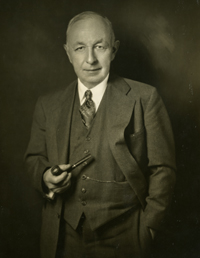 Dr. A. HERMANN PFUND earned his PhD from the Physics Department at The Johns Hopkins University in 1906. He went on to serve as a professor and chair of that department and became part of the pantheon of scholars whose discoveries in optics ultimately led to the birth of the astrophysics program in Johns Hopkins. This enduring legacy began in the late 1800s with Henry Rowland, one of the five original members of the Hopkins faculty. Dr. Rowland’s work provided the foundation for a generation of spectroscopy research and inspired another Hopkins scholar, Robert Williams Wood. In turn, it was Dr. Wood who brought Dr. Pfund to Baltimore in 1903.
Dr. A. HERMANN PFUND earned his PhD from the Physics Department at The Johns Hopkins University in 1906. He went on to serve as a professor and chair of that department and became part of the pantheon of scholars whose discoveries in optics ultimately led to the birth of the astrophysics program in Johns Hopkins. This enduring legacy began in the late 1800s with Henry Rowland, one of the five original members of the Hopkins faculty. Dr. Rowland’s work provided the foundation for a generation of spectroscopy research and inspired another Hopkins scholar, Robert Williams Wood. In turn, it was Dr. Wood who brought Dr. Pfund to Baltimore in 1903.
In addition to his many discoveries, Dr. Pfund is remembered at Hopkins for mentoring William George Fastie who went on to use his atomic spectroscopy in space exploration. The rocket program that Dr. Fastie developed at Hopkins grew into the Far Ultraviolet Spectroscopic Explorer, a NASA space satellite that operated out of the Physics and Astronomy Department, as well as the Hubble Space Telescope, whose science institute is located on the Homewood campus.
As a result of the pioneering work of Dr. Pfund and his colleagues, Baltimore is today one of the premiere world centers in space astronomy. Johns Hopkins owes a great debt of gratitude to Dr. A Hermann Pfund for his tremendous contributions to the field of physics and astronomy and to the university itself. The Johns Hopkins University is honored to serve as home of the Dr. A Hermann Pfund Professorship.